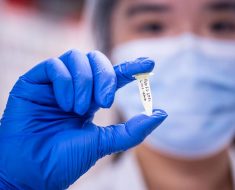A DNA vaccine tested in mice reduces the accumulation of tau and beta-amyloid — two toxic proteins associated with Alzheimer’s disease, according to research published in Alzheimer’s Research and Therapy. The animal trial, in which a vaccine delivered to the skin prevents the buildup of the two toxic proteins via an immune response, did not trigger the type of brain swelling that derailed previous experiments, opening the door to possible clinical trials.
The vaccine, which contains DNA coding for a segment of beta-amyloid that also reduces tau in mice modeled for Alzheimer’s, had previously been successfully tested on rabbits and monkeys. The tau and beta-amyloid proteins kill brain cells as they create plaques and neuron tangles within the brain of Alzheimer’s patients. The study was conducted by Dr. Roger Rosenberg, the founding director of the Alzheimer’s Disease Center at UT-Southwestern’s Peter O’Donnell Jr. Brain Institute.
Dr. Rosenberg’s study built upon the success of previous studies, which had shown that antibodies can significantly reduce amyloid buildup in the brain. A previous vaccine had shown promise, but had caused brain swelling in some patients during its clinical trials. Dr. Rosenberg built upon those successes but started with DNA coding for amyloid and injected it into the skin instead of the muscle, producing a different kind of immune response. That immune response successfully created a buildup of antibodies that not only suppressed amyloid buildup, but also the buildup of tau.
The study resulted in a 40 percent reduction in amyloid and a 50 percent reduction in tau in test subjects, with no adverse effects. It is uncertain that amyloid and tau are responsible for Alzheimer’s disease, but if they are and the vaccine promotes the same reduction rates in humans, it could have significant value as a potential therapy for the disease.
“This study is the culmination of a decade of research that has repeatedly demonstrated that this vaccine can effectively and safely target in animal models what we think may cause Alzheimer’s disease,” said Dr. Roger Rosenberg, founding director of the Alzheimer’s Disease Center at UT Southwestern. “I believe we’re getting close to testing this therapy in people.”
“If the onset of the disease could be delayed by even five years, that would be enormous for the patients and their families,” said Dr. Doris Lambracht-Washington, the study’s senior author. “The number of dementia cases could drop by half.”
There is currently no effective cure or treatment for Alzheimer’s disease.
Source: Read Full Article





